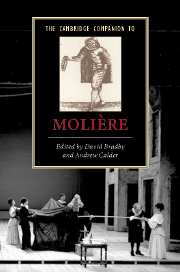Book contents
- Frontmatter
- 1 The career strategy of an actor turned playwright: 'de l’audace, encore de l’audace, toujours de l’audace’
- 2 The material conditions of Molière’s stage
- 3 The master and the mirror: Scaramouche and Molière
- 4 Molière as satirist
- 5 How (and why) not to take Molière too seriously
- 6 L’Avare or Harpagon’s masterclass in comedy
- 7 Laughter and irony in Le Misanthrope
- 8 Comédies-ballets
- 9 Le Bourgeois gentilhomme: Molière and music
- 10 Medicine and entertainment in Le Malade imaginaire
- 11 Molière and the teaching of Frenchness: Les Femmes savantes as a case study
- 12 L'École des femmes: matrimony and the laws of chance
- 13 Molière nationalised: Tartuffe on the British stage from the Restoration to the present day
- 14 Landmark twentieth-century productions of Molière: a transatlantic perspective on Molière: mise en scène and its historiography
- 15 Dom Juan the Directors’ Play
- 16 ‘Reculer pour mieux sauter’: modern experimental theatre’s debt to Molière
- Select bibliography
- Index
- Series List
15 - Dom Juan the Directors’ Play
Published online by Cambridge University Press: 28 March 2007
- Frontmatter
- 1 The career strategy of an actor turned playwright: 'de l’audace, encore de l’audace, toujours de l’audace’
- 2 The material conditions of Molière’s stage
- 3 The master and the mirror: Scaramouche and Molière
- 4 Molière as satirist
- 5 How (and why) not to take Molière too seriously
- 6 L’Avare or Harpagon’s masterclass in comedy
- 7 Laughter and irony in Le Misanthrope
- 8 Comédies-ballets
- 9 Le Bourgeois gentilhomme: Molière and music
- 10 Medicine and entertainment in Le Malade imaginaire
- 11 Molière and the teaching of Frenchness: Les Femmes savantes as a case study
- 12 L'École des femmes: matrimony and the laws of chance
- 13 Molière nationalised: Tartuffe on the British stage from the Restoration to the present day
- 14 Landmark twentieth-century productions of Molière: a transatlantic perspective on Molière: mise en scène and its historiography
- 15 Dom Juan the Directors’ Play
- 16 ‘Reculer pour mieux sauter’: modern experimental theatre’s debt to Molière
- Select bibliography
- Index
- Series List
Summary
Until the middle of the last century, Dom Juan was one of Molière's least valued plays. Withdrawn - possibly suppressed - after its initial run, and sidelined during nearly three centuries of critical and theatrical neglect, it came into its own during the twentieth century, when it featured prominently in the experiments of major theatre artists throughout Europe. In France it came to be seen as a touchstone of directorial art and, with Le Misanthrope, became one of the two most frequently performed works of the entire repertoire.
The ubiquity of Dom Juan is such that to recount its performance history would effectively be to describe the most significant directorial tendencies of the twentieth century. This essay, which can only hint at the richness of the play's stage life, has a twofold purpose. First, to account for its singular place in the history of the stage. Second, to evoke a sample of modern productions. By comparing some stage interpretations in their respective contexts it is possible to see how, by being constantly reactualised, a text composed in 1665 to meet a specific need can resonate profoundly in different and varied cultural contexts.
To elaborate on the last point: contemporary culture is saturated with cultures of the past to the point where they become naturalised and virtually invisible. Al Pacino directs Shakespeare, Claude Chabrol films Madame Bovary, John Lennon sings on the radio every day. However, not all the past is of equal interest or value to us.
- Type
- Chapter
- Information
- The Cambridge Companion to Moliere , pp. 201 - 214Publisher: Cambridge University PressPrint publication year: 2006



